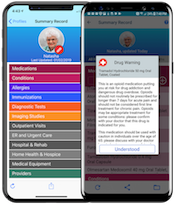Medicare
See the following -
Hospital CEOs Behaving Badly And The Devastating Consequences On The Middle Class
 When big health insurers propose mergers, it makes for good antitrust enforcement theater to try to block them. However, if government officials want to address anti-competitive activities that have a dramatically bigger impact, they should shift their focus to local market provider M&A activity that consistently show prices increase after the deal is done. However, the most rapacious, anti-competitive practices I’ve seen in my entire career have come from hospitals–frequently from tax-exempt “nonprofits” that would make John D. Rockefeller blush with their brutal actions. The combined impact has created a middle class economic depression that has driven populist presidential campaign success, which was highlighted in a recently released Brookings study.
When big health insurers propose mergers, it makes for good antitrust enforcement theater to try to block them. However, if government officials want to address anti-competitive activities that have a dramatically bigger impact, they should shift their focus to local market provider M&A activity that consistently show prices increase after the deal is done. However, the most rapacious, anti-competitive practices I’ve seen in my entire career have come from hospitals–frequently from tax-exempt “nonprofits” that would make John D. Rockefeller blush with their brutal actions. The combined impact has created a middle class economic depression that has driven populist presidential campaign success, which was highlighted in a recently released Brookings study.
- Login to post comments
Hospital Chain Inquiry Cited Unnecessary Cardiac Work
In the summer of 2010, a troubling letter reached the chief ethics officer of the hospital giant HCA, written by a former nurse at one of the company’s hospitals in Florida. In a follow-up interview, the nurse said a doctor at the Lawnwood Regional Medical Center, in the small coastal city of Fort Pierce, had been performing heart procedures on patients who did not need them, putting their lives at risk. Read More »
- Login to post comments
Hospitals Buying More Doctors' Practices
The question is whether costs will decrease, patients will benefit in long run. Hospitals across the country are buying more physician practices as they prepare to move away from fee-for-service reimbursements to a system that pays for treatments focusing on outcomes and cost containment. Read More »
- Login to post comments
How Data Analytics, GIS Helps Dartmouth Atlas Influence Healthcare
The Dartmouth Atlas of Health Care has more than 100 TB of Medicare claims data. This information, combined with peer-reviewed medical research, informs healthcare policy and helps institutions compare their quality metrics. Like any good atlas, it also uses data-driven maps to prove its points. Read More »
- Login to post comments
How Fast is Health IT Spreading and What Are the Benefits
Adoption of health information technology (IT) throughout the health care system is “on the march,” according to Farzad Mostashari, the national coordinator for health IT. Nearly 2,000 US hospitals and more than 41,000 doctors have now met the standards for achieving meaningful use of health IT, and have received $3.1 billion in federal incentive payments as a result. Read More »
- Login to post comments
How Much Are Misaligned Incentives In Health Care Costing Tax Payers?
On Christmas Eve, I took care of a patient who had just undergone surgery for an infected artificial shoulder. He was to be discharged on intravenous antibiotics three times a day for six weeks. [...] The total cost of this is approximately $7000 for nursing visits, antibiotics and supplies... Read More »
- Login to post comments
How Shifts In Washington Will Affect Physicians In 2015
As a result of November’s elections, come January, Republicans will take control of the Senate and increase their majority in the House to levels we haven’t seen since before FDR took office. Given this shift in power and the sharp differences between the two parties, many have spent the past month wondering how this change will impact healthcare and the programs, policies, and regulations currently in place...
- Login to post comments
How the healthcare system discourages creating low-cost solutions
The U.S. leads the world in creating new drugs and healthcare tech, but the system discourages inventors from creating cost-lowering technologies in favor of ones with a healthy return on investment, according to an article at the Journal of the American Medical Association. "In the United States, the surest way to generate a healthy return on investment is to increase health care spending, not reduce it," says the authors, from the Uniformed Services University of the Health Sciences and Yale School of Medicine.
- Login to post comments
Humetrix Demonstrates DIRECT and Mobile Enabled Provider-to-Patient EHR Exchange for Interoperability with the Cerner EHR at Health 2.0 Fall Conference
At the Health 2.0 Fall Conference Humetrix will demo its suite of apps; iBlueButton, SOS QR, and Tensio at booth #308. On October 3, Humetrix and Cerner will participate in a session entitled “Breaking Down the Silos” taking place at 11:20 a.m. During the session, Humetrix will demo the award-winning mobile health platform, iBlueButton, which enables patients to immediately receive, at any point of care, their summary health record from any federally certified EHR system using the DIRECT secure messaging protocol.
- Login to post comments
Humetrix Presents Disruptive Personal Health App Solutions Before US Congress
 As a former practicing physician, data scientist and public health officer, I became a healthcare IT entrepreneur focusing on mobile technology because I believed that the best way to treat patients, improve health outcomes, and reduce waste is to put patients’ critical health information into their own hands, so they can share that information with their physicians when needed. With 68 percent of Americans using a smart phone daily1, and new HIPAA rules giving each of us a legal right to electronically access our health records, consumer facing mobile health applications can be a cure to the information blocking which is still plaguing our health care system. In a healthcare environment in which one-third of expenditures are wasted3 on redundant care, and medical errors representing the third leading cause of death in the U.S. today4, having immediate access to a patient’s health history can literally save lives and also significantly reduce healthcare costs.
As a former practicing physician, data scientist and public health officer, I became a healthcare IT entrepreneur focusing on mobile technology because I believed that the best way to treat patients, improve health outcomes, and reduce waste is to put patients’ critical health information into their own hands, so they can share that information with their physicians when needed. With 68 percent of Americans using a smart phone daily1, and new HIPAA rules giving each of us a legal right to electronically access our health records, consumer facing mobile health applications can be a cure to the information blocking which is still plaguing our health care system. In a healthcare environment in which one-third of expenditures are wasted3 on redundant care, and medical errors representing the third leading cause of death in the U.S. today4, having immediate access to a patient’s health history can literally save lives and also significantly reduce healthcare costs.
- Login to post comments
Humetrix to Demo its Award-Winning SOS QR Emergency & Disaster Preparedness Mobile Platform at FCC Accessibility Innovations Expo
Humetrix, developer of the award-winning SOS QR emergency mobile platform, last year’s recipient of the FCC Chairman’s Awards for Advancements in Accessibility (AAA), is honored to participate in this year’s FCC Accessibility Innovation Expo taking place on October 23 in Washington, DC.
- Login to post comments
Humetrix to Unveil its Medicare Approved iBlueButton 8.0 Mobile Platform at CES in Vegas
 At CES, Humetrix will unveil at booth 43943 of the Tech West/Sands Expo Health & Wellness Marketplace, its iBlueButton 8.0 mobile health platform approved by the Centers for Medicare and Medicaid Services (CMS) for use by 53 million Americans covered by Medicare. A consumer life and cost saving digital health tool, iBlueButton 8.0 was introduced at the White House Blue Button Conference in August 2018 to illustrate how CMS approved applications powered by the Medicare Blue Button claim database can help millions of Americans in the Medicare program better manage their often complex and at times error-prone healthcare.
At CES, Humetrix will unveil at booth 43943 of the Tech West/Sands Expo Health & Wellness Marketplace, its iBlueButton 8.0 mobile health platform approved by the Centers for Medicare and Medicaid Services (CMS) for use by 53 million Americans covered by Medicare. A consumer life and cost saving digital health tool, iBlueButton 8.0 was introduced at the White House Blue Button Conference in August 2018 to illustrate how CMS approved applications powered by the Medicare Blue Button claim database can help millions of Americans in the Medicare program better manage their often complex and at times error-prone healthcare.
- Login to post comments
Humetrix to Unveil Medicare Blue Button FHIR API Enabled iBlueButton Mobile Platform at HIMSS18
 At HIMSS March 5-8, Humetrix is proud to be part of the Centers for Medicare and Medicaid Services (CMS) Blue Button® API program launch to enable Medicare beneficiaries to connect their Medicare claims data to the applications, services, and research programs they trust. Three-time award winner of the ONC Investing in Innovation competition for Blue Button, Humetrix has been a fierce advocate and a Blue Button technology industry leader from the start, providing Veterans, TRICARE and Medicare beneficiaries mobile access to their Blue Button data with the iBlueButton mobile platform.
At HIMSS March 5-8, Humetrix is proud to be part of the Centers for Medicare and Medicaid Services (CMS) Blue Button® API program launch to enable Medicare beneficiaries to connect their Medicare claims data to the applications, services, and research programs they trust. Three-time award winner of the ONC Investing in Innovation competition for Blue Button, Humetrix has been a fierce advocate and a Blue Button technology industry leader from the start, providing Veterans, TRICARE and Medicare beneficiaries mobile access to their Blue Button data with the iBlueButton mobile platform.
- Login to post comments
Hundreds Of Thousands Of Medicare Recipients To Lose Telehealth Services
Realignment of census lines moves Medicare beneficiaries from rural to metropolitan Read More »
- Login to post comments
ICD-10 Two Months In: Consultants Give an Inside Look at How the Transition Has Impacted the Industry
 Leading up to the healthcare industry’s transition to the ICD-10 coding set on Oct. 1, 2015, there seemed to be a collective feeling of uncertainty on the part of providers—particularly physician practices that frequently expressed doubt about their readiness for the shift. What’s more, numerous pieces of legislation were introduced into Congress, several of which advocated a “grace period” where healthcare providers’ ICD-10-based claims submitted to Medicare and Medicaid would not be denied due to coding errors. This led to providers becoming even more leery if the transition would indeed occur on the set date, given that it was delayed three times previously...
Leading up to the healthcare industry’s transition to the ICD-10 coding set on Oct. 1, 2015, there seemed to be a collective feeling of uncertainty on the part of providers—particularly physician practices that frequently expressed doubt about their readiness for the shift. What’s more, numerous pieces of legislation were introduced into Congress, several of which advocated a “grace period” where healthcare providers’ ICD-10-based claims submitted to Medicare and Medicaid would not be denied due to coding errors. This led to providers becoming even more leery if the transition would indeed occur on the set date, given that it was delayed three times previously...
- Login to post comments